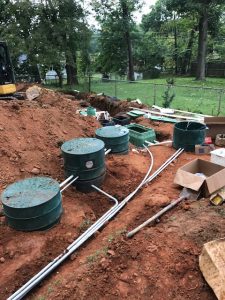
While we may not often think about it, septic systems play a vital role in safeguarding our environment. These on-site wastewater treatment systems are responsible for managing the sewage from millions of households worldwide. By adopting proper septic system care practices, homeowners can contribute significantly to environmental preservation.
Protection of Groundwater Quality:
One of the most crucial environmental benefits of maintaining a septic system properly is the protection of groundwater quality. When septic systems are well-maintained and functioning correctly, they effectively treat wastewater before it is released into the ground. A healthy drain field and properly functioning soil help remove harmful pathogens and pollutants, preventing them from contaminating the groundwater, which serves as a primary source of drinking water for many communities.
Reduction of Water Pollution:
Septic systems that are not adequately maintained can release untreated or poorly treated wastewater into nearby water bodies, such as rivers, lakes, and streams. This can lead to water pollution, negatively impacting aquatic ecosystems and the wildlife that rely on these bodies of water. Proper septic care ensures that wastewater is treated adequately, reducing the potential for harmful pollutants to reach nearby water sources.
Preservation of Ecosystems:
Wastewater contains nutrients like nitrogen and phosphorus, which, when released in excessive amounts, can cause harmful algal blooms in water bodies. These blooms deplete oxygen levels and lead to “dead zones,” where aquatic life struggles to survive. By maintaining septic systems properly, nutrient overload can be minimized, preserving the balance of ecosystems, and supporting biodiversity in surrounding areas.
Mitigation of Soil Contamination:
A malfunctioning septic system can leak untreated sewage into the soil, leading to soil contamination. This contamination can negatively impact soil fertility and can also pose health risks to plants, animals, and even humans who encounter the contaminated soil. Regular maintenance and proper care of septic systems help prevent leaks and minimize soil contamination.
Reduction of Greenhouse Gas Emissions:
When septic systems do not function properly, they may produce excess methane and other greenhouse gases because of improper decomposition of organic matter. Methane is a potent greenhouse gas that contributes to climate change. By maintaining septic systems and ensuring proper decomposition, homeowners can reduce their carbon footprint and contribute to global efforts to combat climate change.
Conserving Water Resources:
Proper septic system care involves water conservation practices. Water is a precious resource, and excessive water usage can strain local water supplies. By adopting water-saving habits and promptly fixing any leaks or plumbing issues, homeowners can help conserve water resources and support sustainable water management.
Contact Freedom Septic Service at (410) 795-2947 today or visit us online for more information!

Leave a Reply
You must be logged in to post a comment.